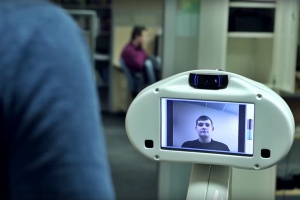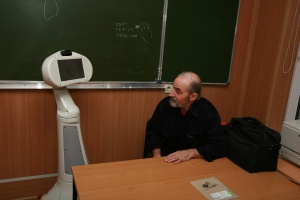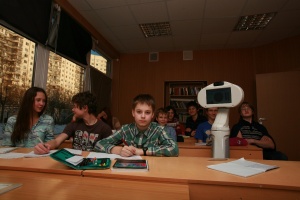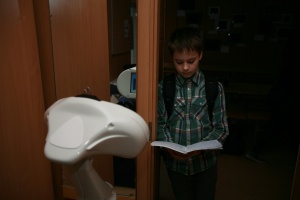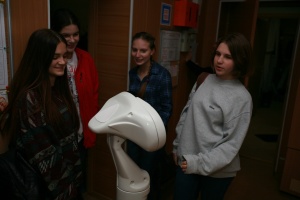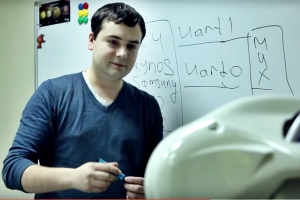
Webot, a telepresence robot, supports children who cannot attend school by ‘representing’ them in class. photo courtesy of Wicron (click on image to enlarge)
The first Day of September is known in Russia as Den znanii (‘Knowledge Day’). All across the vast country, crowds of still-fresh students and somewhat-excited schoolchildren gather to hear university presidents and schoolmasters ring the ‘first bell’. The quaint ceremony traditionally marks the opening of the school year.
Yet for children with disabilities who can neither join the festivities nor attend class this day might be a difficult and painful one. But help is on the way: this year, for the first time in Russia, a smart telepresence robot will go to school. Webot, developed by a team of Skoltech PhD students, stands in for pupils who cannot attend class.
The mobile, friendly white robot will be installed in five elementary schools in the Astrakhan region. It is equipped with a flat screen, camera and microphone designed to easily transmit anything students with disabilities need to see and know: lectures, activities, or homework assignments.
Webot‘s round head unit and long ‘neck’ rotate in all directions, and the robot can follow any person – a teacher, a friend, even a first love. And if the home-ridden student wishes to answer a question, Webot will be happy to do that for them. The robot can even joke around.
“Equality and Opportunity for all Children”
“It is like an avatar, allowing kids to move around, even from a distance”, says Stas Ashmanov, a Skoltech PhD student with Prof Ivan Oseledets and managing partner of Wicron, a Moscow based startup behind Webot and smart home assistants. “It is as if we ‘teleport’ kids from home to school. We want kids to know that even if they are in pain or limited in movement, they can still learn and grow and participate in school life. It is all about equality and opportunity for all children”.
How does the technology actually work? Webot’s functionalities are managed and controlled over the internet. All a remote student needs to do is switch on her or his home computer and go online. When connected to ‘its’ student, the robot immediately faces the user and represents it in the classroom. When fully charged, the robot’s battery lasts the whole day.
The developers – which include Ashmanov, along with fellow students Dmitry Suvorov and Roman Zhukov (PhD candidates under the guidance of prof Dzmitry Tsetserukou) – feel the ambitious project is a perfect example of Skoltech’s goal to create innovation that positively impacts society. Webot’s school tele-presence project was crowd funded, and receives support and guidance from Russia’s Ministry of Education. Currently, each of the five schools participating in the experiment received one robot. Future plans foresee more robots attending classrooms nationwide.
